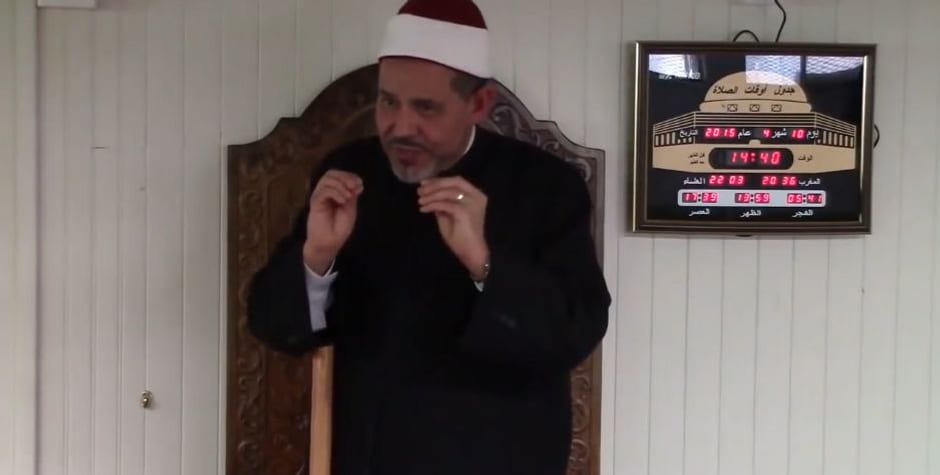

Toulouse Imam Case: ECLJ Intervenes in Support of Fundamental Values of the Convention
Toulouse Imam Case: Democracy vs Radical Islam
The ECLJ has intervened as amicus curiae in the case of Mohamed Tataiat v. France (application no. 7874/24), currently pending before the European Court of Human Rights (ECHR). This case raises crucial questions about the ability of a European democracy such as France to oppose Islamism when it invokes human rights to justify its hate speech and incitement to violence against other religions, and in particular against the Jewish people (read our observations here).
The facts of the case: a criminal conviction for incitement to hatred
The applicant, Mohamed Tataiat, is an Algerian imam in Toulouse. He was prosecuted for remarks made during a sermon on December 15, 2017 in the city's main mosque. The sermon was filmed and broadcast on the Internet, reaching a wide audience.
In this sermon, expressing his wish for the imminent destruction of Israel, he quoted the following hadith: "The day will come when the stones and trees will say: ‘O Muslim, there is a Jew behind me, come and kill him!’. These remarks were interpreted by the French courts as inciting hatred or violence towards Jews as a group.
In a ruling dated August 31, 2022, the Toulouse Court of Appeal overturned the acquittal handed down in the first instance and sentenced Mr. Tataiat to four months' imprisonment, suspended, accompanied by a judicial publication measure. The Court of Cassation, to which the case was referred, upheld the decision on December 19, 2023. Imam Mohamed Tataiat was sent back to Algeria.
Before the ECHR, the applicant invoked Article 10 of the European Convention on Human Rights, arguing that his conviction constituted a violation of his freedom of expression.
This case balances two fundamental interests: freedom of religious expression and protection against hate speech.The context is a national and European backdrop marked by rising Islamist radicalization and anti-Semitism.
The issue is whether the disputed statements fall within the scope of protected speech under freedom of expression or whether they exceed the limits of what is tolerable under the Convention, in particular Article 17, which prohibits abuse of rights.
As an organization committed to defending human rights based on Christian values and the principles of the Convention, the ECLJ considered it essential to intervene in this case.
The ECLJ submitted detailed written observations, structured around the following main points.
Abuse of rights
The ECLJ maintains that Mr. Tataiat's statements cannot benefit from the protection of Article 10, as they constitute an abuse of rights prohibited by Article 17 of the Convention.
The Court has already ruled out the protection of Article 10 in similar cases where the speech undermined the fundamental values of the Convention, in particular tolerance, social peace, and respect for the rights of others (see Garaudy v. France, Belkacem v. Belgium, Pavel Ivanov v. Russia). The ECLJ recalls that in the case of Hizb ut-Tahrir v. Germany, the Court confirmed that incitement to religious or racial hatred, or to violence, even if based on allegedly religious or political speech, cannot be protected.
The ECLJ warns against the risk of misuse of the Convention. Freedom of expression cannot be invoked to protect speech that destroys the very foundations of social cohesion.
The applicant's attempt to benefit from the protection of Article 10 while spreading a message of exclusion towards an ethno-religious group falls within this logic of “abuse of rights.”
Article 17 exists precisely to protect the Convention against those who wish to use it to undermine its values.
The nature of the statements: not religious criticism, but a call to hatred
An analysis of the statements shows that they do not constitute criticism of the State of Israel or an abstract religious analysis, but a message of exclusion and rejection, formulated by a religious authority in a specific context. This is not a case of “blasphemy,” a concept that enjoys a certain degree of tolerance in the Court's case law (see Otto-Preminger Institut), but an indirect yet explicit call for violence against an identifiable community. The ECLJ also emphasizes the historical and doctrinal link between militant anti-Zionism and anti-Semitism, which is widely recognized by many European authorities. The ECLJ points out that at the time the hadiths were written, the word Israel referred to the Jewish people, not the State of Israel, which did not exist. Thus, wanting the destruction of Israel means wanting the destruction of the Jewish people.
The context of the case: a tense local and national situation
The remarks were made in Toulouse, a city deeply scarred by the attacks carried out by Mohamed Merah in 2012, several of whose victims were Jewish children.
The speech was broadcast on the internet, outside its liturgical context, reaching a much wider audience, including many young people, in a digital environment conducive to radicalization. Furthermore, statistics on anti-Semitic acts in France are alarming: their number almost doubled between 2015 and 2024. The overrepresentation of anti-Semitism in certain segments of the Muslim population, particularly among young people, gives this type of message an aggravating potential.
The applicant's position of authority: increased responsibility
The applicant is not an ordinary citizen, but an imam, a spiritual authority figure with a special status and audience. This authority implies a heightened moral and social responsibility. As emphasized by the European Commission against Racism and Intolerance (ECRI), religious leaders have a decisive role to play in social cohesion or, conversely, in its destabilization.
Proportionate and necessary interference in a democratic society
The ECLJ considers that Mr. Tataiat's conviction is legally valid, pursues a legitimate aim (prevention of crime, protection of the rights of others, preservation of public order) and is proportionate to the aim pursued. The Court has already held, in Perinçek v. Switzerland, that the analysis of the context, the nature of the statements, the intention and the scope of the dissemination was central. Applied here, this analytical framework justifies the interference.
The case of Tataiat v. France is emblematic of the contemporary tensions between freedom of expression and religion and social cohesion. It illustrates the challenges faced by European states in their fight against hate speech in a context of rising Islamism.
Through its intervention, the ECLJ calls on the Court to show firmness in defending the fundamental values of the Convention. It is essential that European case law continues to draw a clear line between freedom of expression and the instrumentalization of that freedom for the purposes of hatred or violence.













